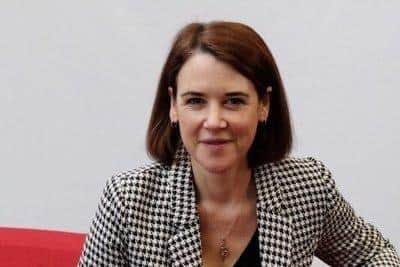NHS Scotland funding crisis: Healthcare service facing £395m deficit as costs' spiralling out of control'
NHS Scotland is facing a £395 million deficit this year, amid spiralling waiting lists and stagnant accident-and-emergency (A&E) waiting times, leading opposition parties to warn “the crisis risks spiralling out of all control”.
In a letter to the Scottish Parliament’s health and social care committee, NHS Scotland chief executive Caroline Lamb said: "The consolidated position for all NHS boards at month six of 2023/24 is a forecast deficit of £395m.”
Advertisement
Hide AdAdvertisement
Hide AdMs Lamb went on to say she has "made clear my expectations of all NHS boards, the scale of the deficit must reduce and I expect the 3 per cent recurring savings target to be worked towards both in 2023/24 and 2024/25”.


Scottish Liberal Democrats leader Alex Cole-Hamilton said: “This is as clear a warning as there could be that hospitals and health boards are overstretched. People will be worried that this dire outlook will mean cuts to services and even longer waits.
“We need to fix the mess that the NHS has been left in by the SNP because the crisis risks spiralling out of all control.
“Humza Yousaf was health secretary for years as these problems stacked up. He needs to take a share of the blame and order his ministers to get to work repairing the health service before patients and staff pay an even greater price."
Dr Sandesh Gulhane, the Scottish Conservatives’ shadow health secretary, said the letter from Ms Lamb “fully exposes the SNP’s staggering mismanagement of Scotland’s NHS during their 16 years in power”.


“Only last week we learned how the health budget was underspent by an astonishing £200m, despite record funding from the UK Government,” he said. “Successive SNP health secretaries’ dire workforce planning has pushed frontline services beyond breaking point.
“The discredited health secretary Michael Matheson must be upfront as to where further cuts are going to be imposed in the NHS, which will have a devastating impact on patients and my dedicated colleagues.”
A Scottish Government spokesperson said ministers would “continue to prioritise investment in frontline services”, and that a funding increase of £730m – roughly 6 per cent – had been provided for NHS boards in 2023/24.
Advertisement
Hide AdAdvertisement
Hide Ad“Despite record investment, there remains significant financial challenge across health and social care,” the spokesperson said. "Inflation, rising energy costs and the ongoing impacts of Covid and Brexit, along with rising demand, mean that the finite funding available is required to deliver more.
“We are working closely with all boards to deliver essential reform and sustainable services fit for the future. We continue to engage with boards to support the best use of resources whilst ensuring that Covid recovery and patient safety remain the priority.”
Confirmation of the scale of the deficit comes against a backdrop of spiralling waiting lists throughout the healthcare system.
According to statistics released by Public Health Scotland (PHS), 525,654 people are waiting for outpatient procedures in Scotland, as of September 30. A total of 151,093 people were waiting for inpatient or day case treatment on the same date and 151,651 were waiting for one of the eight key diagnostic tests.
In total, 828,398 people were on an NHS waiting list at the end of September, up from 820,352 at the end of June.
Scottish Labour deputy leader Dame Jackie Baillie said the figures showed the “NHS is on the brink of disaster” ahead of the winter period. For outpatient procedures, a total of 308,497 were completed in the three months up to September 30, an increase of 1.8 per cent from the previous quarter.
However, just 63.4 per cent of those completed were done in less than 12 weeks, down from 66.1 per cent when compared to the period between March and June.
The total number of people waiting increased by 2.2 per cent compared to the previous quarter, with PHS blaming the impact the pandemic had on planned care. The body said the waiting list was now more than double the size it was at the end of March 2020.
Advertisement
Hide AdAdvertisement
Hide AdThe Scottish Government set new targets in July last year aimed at stemming long waits for treatment, including “eradicating” waits over two years by August 2022, waits of over 18 months by last December and waits of over a year by March this year.
PHS said this has “yet to be achieved”, despite some drops in long waits, with 862 people waiting more than two years, 6,187 waiting more than 18 months and 40,052 on the list for more than a year.
A&E waiting times in Scotland have continued to stagnate as less than two-thirds of people were seen within four hours, according to PHS figures.
In the week up to November 19, 63.5 per cent of attendances at emergency departments were seen and subsequently admitted, transferred or discharged within the target time of four hours.
The Scottish Government aims for this figure to be at 95 per cent. The number dropped slightly from 63.9 per cent the previous week.
Meanwhile, the former chief executive of NHS Scotland, Professor Paul Gray, has called for a debate about whether the private sector should have a greater involvement in healthcare.
Speaking to the BBC, Prof Gray said the health service was "unsustainable" in its current form, with pressure on staff growing and service to patients deteriorating.
"If we decide that actually the way we do it is the best way, of all the choices we could make, that's OK, we've had the conversation,” he said. "If on the other hand, we decide there's more space for the private sector, perhaps they could do more, then good, that's fine too."
Prof Gray added: "I also think I hear and detect a genuine will to have the conversation. On balance my perspective is one of hope, not one of despair."
Comments
Want to join the conversation? Please or to comment on this article.